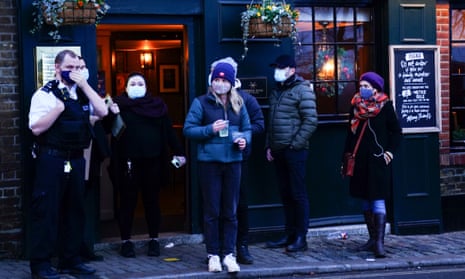For the second time in my adult life, I feel we must have a national conversation about domestic compulsory ID. Last time, in the mid-00s, it was an authoritarian solution looking for a problem to fix, with immigration, benefit fraud and everything but climate change proffered as justification. This time the problem posed by the government’s catastrophic “economy first” approach to pandemic management is all too clear. Still, the introduction of an internal passport will be just as costly, divisive and counterproductive as before – and even more dangerous to any way of life worth fighting for beyond this terrible time.
Many people will have watched the government flip-flopping over whether some kind of public or commercially sourced proof of vaccination status should be required before access to a whole host of everyday activities from attending a nightclub or sports event to a trip to the pub or the shops. There have been similarly mixed messages about whether the introduction of such a regime should be left to businesses to decide on and regulate for themselves.
I’m becoming less and less convinced that this constant oscillation marks a mere lack of competence rather than a more malevolent and studied chaos aimed at passing the buck for any further deaths from what international experts call Boris Johnson’s “unethical experiment”. This approach, Herd Immunity 2.0, lets the virus surge, creating fertile territory for vaccine-resistant variants. To be fair, government spokespeople are increasingly brazen about their threat of compulsory ID – an illiberal and discriminatory measure – being a means to force young people to get vaccinated rather than to effectively prevent transmission.
Compulsory vaccination is counterproductive in nations with liberal and libertarian traditions and is unethical given the newness of these vaccines and the paucity of public education or supportive incentives. Necessary social distancing has been particularly cruel to young and older people. Older people arguably had a very direct personal incentive to vaccinate. Why not offer youngsters and everyone in poorly paid and insecure work fully paid time off to recover from any side-effects of taking the jabs?
So what about Labour? With the possibility of a rebellion on the government benches, there has understandably been some interest in what position the opposition might take. It seems the line is currently against vaccination passports as “costly, open to fraud and impractical”. Yet the same spokesperson says that “testing for access to venues would be more efficient, and would give people and business more certainty”.
Let’s unpack that shall we? How is proof of a test less costly or open to fraud than proof of vaccination itself? Further, lateral flow tests are notoriously unreliable. And does our summer of sport suggest that stewards on zero-hours contracts and the minimum wage should be relied upon to interrogate the detail of someone’s daily testing status rather than wave them through for a quieter life? We will not speak of Wembley. Potential super-spreader events are either safe to go ahead or not. That calculation is about our general state of transmission, the health in the community and the capacity of the NHS to cope – not the compromised decisions of outsourced bouncers-turned-Covid cops.
I could rehearse the arguments about racism, sexual harassment and all the other ways in which domestic pass laws of any kind will inevitably lead to discrimination, corruption and oppression. I will only say that as this new kind of compulsory ID is explicitly about health data, it crosses a further line into personal privacy as well as liberty.
It has always been clear to me that there are instinctive liberals and authoritarians on both sides of a left-right political spectrum that is traditionally defined around tax and spend. Yet during our war on Covid, the underlying debates around rights and freedoms come into sharper focus, testing us all. Domestic Covid passports are part of a strategy of smoke and mirrors for a government that would like to believe that “personal responsibility” can substitute for sound and ethical public health policy during a pandemic that has already cost the UK nearly double the civilian fatalities of the second world war.
This is no time for triangulation or political games. This is high time for an honest debate about how we protect each other as a community, and how soon we should be unlocked together in the safest manner, without making those vulnerable on grounds of race, age or economic insecurity pay for so-called “freedom day”.
Lady Shami Chakrabarti was shadow attorney general for England and Wales from 2016 to 2020, and was director of Liberty from 2003 to 2016

